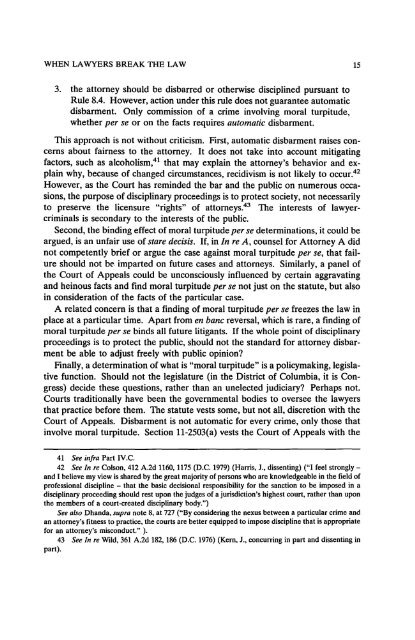The University of the District of Columbia Law ... - UDC Law Review
The University of the District of Columbia Law ... - UDC Law Review
The University of the District of Columbia Law ... - UDC Law Review
You also want an ePaper? Increase the reach of your titles
YUMPU automatically turns print PDFs into web optimized ePapers that Google loves.
WHEN LAWYERS BREAK THE LAW153. <strong>the</strong> attorney should be disbarred or o<strong>the</strong>rwise disciplined pursuant toRule 8.4. However, action under this rule does not guarantee automaticdisbarment. Only commission <strong>of</strong> a crime involving moral turpitude,whe<strong>the</strong>r per se or on <strong>the</strong> facts requires automatic disbarment.This approach is not without criticism. First, automatic disbarment raises concernsabout fairness to <strong>the</strong> attorney. It does not take into account mitigatingfactors, such as alcoholism,41 that may explain <strong>the</strong> attorney's behavior and explainwhy, because <strong>of</strong> changed circumstances, recidivism is not likely to occur.42However, as <strong>the</strong> Court has reminded <strong>the</strong> bar and <strong>the</strong> public on numerous occasions,<strong>the</strong> purpose <strong>of</strong> disciplinary proceedings is to protect society, not necessarilyto preserve <strong>the</strong> licensure "rights" <strong>of</strong> attorneys.43 <strong>The</strong> interests <strong>of</strong> lawyercriminalsis secondary to <strong>the</strong> interests <strong>of</strong> <strong>the</strong> public.Second, <strong>the</strong> binding effect <strong>of</strong> moral turpitude per se determinations, it could beargued, is an unfair use <strong>of</strong> stare decisis. If, in In re A, counsel for Attorney A didnot competently brief or argue <strong>the</strong> case against moral turpitude per se, that failureshould not be. imparted on future cases and attorneys. Similarly, a panel <strong>of</strong><strong>the</strong> Court <strong>of</strong> Appeals could be unconsciously influenced by certain aggravatingand heinous facts and find moral turpitude per se not just on <strong>the</strong> statute, but alsoin consideration <strong>of</strong> <strong>the</strong> facts <strong>of</strong> <strong>the</strong> particular case.A related concern is that a finding <strong>of</strong> moral turpitude per se freezes <strong>the</strong> law inplace at a particular time. Apart from en banc reversal, which is rare, a finding <strong>of</strong>moral turpitude per se binds all future litigants. If <strong>the</strong> whole point <strong>of</strong> disciplinaryproceedings is to protect <strong>the</strong> public, should not <strong>the</strong> standard for attorney disbarmentbe able to adjust freely with public opinion?Finally, a determination <strong>of</strong> what is "moral turpitude" is a policymaking, legislativefunction. Should not <strong>the</strong> legislature (in <strong>the</strong> <strong>District</strong> <strong>of</strong> <strong>Columbia</strong>, it is Congress)decide <strong>the</strong>se questions, ra<strong>the</strong>r than an unelected judiciary? Perhaps not.Courts traditionally have been <strong>the</strong> governmental bodies to oversee <strong>the</strong> lawyersthat practice before <strong>the</strong>m. <strong>The</strong> statute vests some, but not all, discretion with <strong>the</strong>Court <strong>of</strong> Appeals. Disbarment is not automatic for every crime, only those thatinvolve moral turpitude. Section 11-2S03(a) vests <strong>the</strong> Court <strong>of</strong> Appeals with <strong>the</strong>41 See infra Part IV.C.42 See In re Colson, 412 A.2d 1160, 1175 (D.C. 1979) (Harris, J., dissenting) ("I feel stronglyandI believe my view is shared by <strong>the</strong> great majority <strong>of</strong> persons who are knowledgeable in <strong>the</strong> field <strong>of</strong>pr<strong>of</strong>essional discipline - that <strong>the</strong> basic decisional responsibility for <strong>the</strong> sanction to be imposed in adisciplinary proceeding should rest upon <strong>the</strong> judges <strong>of</strong> a jurisdiction'S highest court, ra<strong>the</strong>r than upon<strong>the</strong> members <strong>of</strong> a court-created disciplinary body.")See also Dhanda, supra note 8, at 727 ("By considering <strong>the</strong> nexus between a particular crime andan attorney's fitness to practice, <strong>the</strong> courts are better equipped to impose discipline that is appropriatefor an attorney's misconduct." ).43 See In re Wild, 361 A.2d 182, 186 (D.C. 1976) (Kern, J., concurring in part and dissenting inpart).














